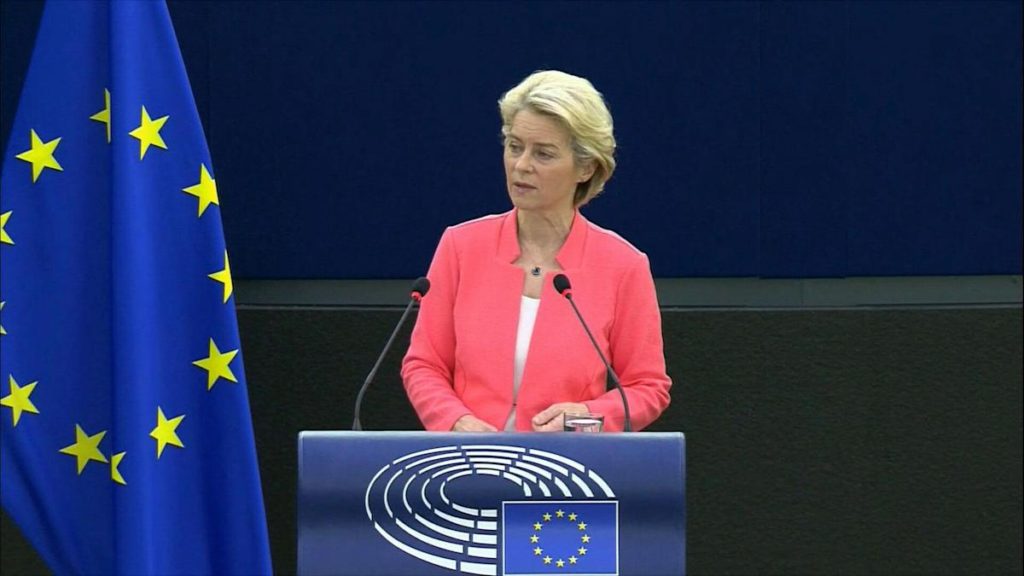European Commission President Ursula von der Leyen went soul-searching in her second State of the Union speech on Wednesday.
This wasn’t her making a joke about the half-empty European Parliament chamber in Strasbourg, but rather a deep-felt reflection on the nature of the EU, which has been tested like never before. Her conclusion? “As I look back on this past year, if I look at the state of the Union today, I see a strong soul in everything that we do.”
Mrs von der Leyen’s tone was focused on the political and high-level questions, sparing the audience the tiny details. She underlined common values and sought out opportunities for the bloc while touching on topical issues.
She mentioned most of the main suspects, with the pandemic naturally coming first. Here, Mrs von der Leyen patted the EU on the back for its response, including its vaccine rollout. From there she moved on to the economy and the importance of digitalisation, which she called a “make-or-break issue”. She then spoke on social issues, climate, world affairs-, defence and migration, before finishing her speech on the European values.
It was one of Mrs von der Leyen’s better speeches, with some memorable language. I felt that the strongest thread was on the EU´s global role. She was ready to look outwards at the EU’s relations with the rest of the world – even if it meant cutting any references to domestic issues from the speech. She did not mention agriculture and regional policies at all, although the two areas account for roughly two thirds of the EU´s actual budget.
The global role also came through in her section on digital policy, where Mrs von der Leyen announced that the EU would present a separate European Chips Act, aiming to bring the entire semiconductors value chin into the EU. This is not just about competitiveness, Mrs von der Leyen said, but also about tech sovereignty, shaping the digital transformation according to the EU’s rules and values.
Bringing production back to EU is a noble goal and I hope that it succeeds. It is excellent that the EU takes steps to ramp up the actual production of digital hardware and is not only pondering the ethical sides of the issue. However, creating such entire value chains may not be so simple in practice – not least when it comes to trying to mine vital rare earth elements on European soil.
The second area where the EU’s global role was highlighted was with climate change. As the EU has now set its own policy plans (the Fit for 55 package unveiled in July) and is trying to agree on the ways to get there, there was not that much more for the President to do besides to put the heat on other global partners. Her message was that they should be as clear in their actions as the EU has been – and pay more. She promised that the EU would top up its €25 billion annual contribution by another €4 billion. This is part of the annual €100 billion annual contribution promised by the developed countries. Whether that helps to get something meaningful out of COP26 climate summit in November remains to be seen.
Mrs von der Leyen’s most interesting bid to raise the EU´s role as a global player came when she spoke about defence. That is an area where the EU lacks influence, as it cannot provide any military heft to match its global economic weight. The EU’s low profile in Syria, North Africa and more recently in Afghanistan has led to calls for more joint action – even though defence issues are a national competence.
So Mrs von der Leyen used the speech to call for a European Defence Union, which she described as Europe “stepping up to the next level”, and also called for a separate EU Cyber Defence Policy. This will be welcomed in Paris, where the French have been keen to develop the EU´s defence policy – and will have the opportunity soon as France takes on the rotating EU presidency beginning of next year.
What should one think about all this? This speech suggests that the Commission will move up a gear what comes to EU’s global presence and external policy. This is not the first time it has been said but perhaps the post-pandemic era gives it a real chance.


